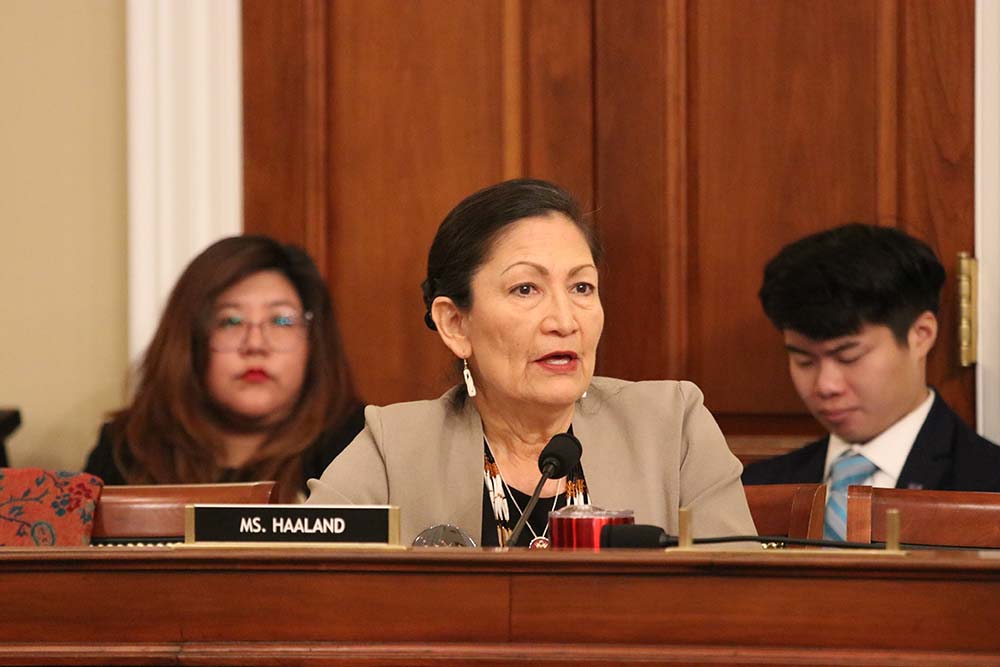
- Details
- By Andrew Kennard
Interior Secretary Deb Haaland (Laguna Pueblo) will outline the Interior Department’s next steps to “begin to reconcile the troubled legacy of federal boarding school policies” on June 22 during the National Congress of American Indians (NCAI) 2021 Mid Year Conference, the department announced Monday.
The announcement follows the recent discovery of a mass unmarked grave of 215 Indigenous children on the grounds of the former Kamloops Indian Residential School in British Columbia, Canada. The finding was met by widespread media coverage, reopening the conversation around the harm and trauma wrought by the federal boarding school systems for Indigenous peoples in the U.S. and Canada.
On June 11, Haaland called for acknowledgement of the past and present impacts of the boarding school system in an op-ed published in The Washington Post.
"Though it is uncomfortable to learn that the country you love is capable of committing such acts, the first step to justice is acknowledging these painful truths and gaining a full understanding of their impacts so that we can unravel the threads of trauma and injustice that linger,” Haaland wrote.
There were 357 Indian boarding schools operating throughout the U.S. from 1819 to the 1960s. In 1925, more than 60,000 children attended the schools. The federal government and church organizations were responsible for managing the schools, where students were forbidden from practicing their culture or speaking their native language, and many endured physical, sexual, emotional, and psychological abuse.
The Canadian residential school system operated from the 1880s to the late 1990s for the same purpose: taking Indigenous children from their families and stripping them of their culture. There, Indigenous children experienced similar horrors of physical and sexual abuse, as well as high mortality rates in the schools.
Poor, overcrowded conditions and disease led to thousands of student deaths in the boarding school systems, and many students’ remains were not returned to their families. The harmful intergenerational effects of the schools lives on in many Indigenous communities in the U.S. and Canada.
Along with Principal Deputy Assistant Secretary for Indian Affairs Bryan Newland, Haaland will announce the next steps in addressing the legacy of the U.S. federal boarding school system during the NCAI’s “Department of the Interior Update” at 2:50 p.m. EDT.
The conference’s full agenda, which runs from June 20-24, is accessible here. You can still register for the conference here.
Tell Us What You Think
More Stories Like This
Native News Weekly (August 25, 2024): D.C. BriefsNative News Weekly (February 22, 2026): D.C. Briefs
NCAI Releases Sttatement on the Passing of Rev. Jesse Jackson
Colusa Indian Energy Participates in Port of Quincy Town Hall on Columbia Basin Power Project
Q&A: Jingle Dress Dancer Answered Call to Ceremony in Face of ICE Violence
Help us defend tribal sovereignty.
At Native News Online, our mission is rooted in telling the stories that strengthen sovereignty and uplift Indigenous voices — not just at year’s end, but every single day.
Because of your generosity last year, we were able to keep our reporters on the ground in tribal communities, at national gatherings and in the halls of Congress — covering the issues that matter most to Indian Country: sovereignty, culture, education, health and economic opportunity.
That support sustained us through a tough year in 2025. Now, as we look to the year ahead, we need your help right now to ensure warrior journalism remains strong — reporting that defends tribal sovereignty, amplifies Native truth, and holds power accountable.
 The stakes couldn't be higher. Your support keeps Native voices heard, Native stories told and Native sovereignty defended.
The stakes couldn't be higher. Your support keeps Native voices heard, Native stories told and Native sovereignty defended.
Stand with Warrior Journalism today.
Levi Rickert (Potawatomi), Editor & Publisher

